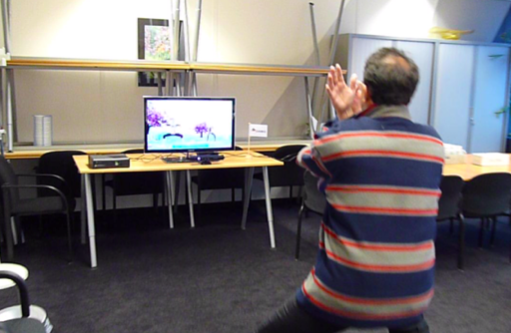Using narrative literature reviews to make sense of exergaming in later life.
The Dutch historian Johan Huizinga (1950 [1938]) viewed games as a fundamental aspect of life. As long ago as 1938, he observed that, next to “homo faber” (man the maker), there is also the concept of “homo ludens” (man the player).
The aim of this research report is to explore what we can learn from previously conducted empirical studies about the motivation and capability of older adults to use exergames as a therapeutic instrument and the impact on their wellbeing. Although attention is also given to the empirical evidence on the impact of playing such games, the focus is on exploring how older adults make sense or do not make sense of such games. So, no systematic literature reviews were performed and this research report therefore presents the results of the narrative literature reviews we conducted. Results are not only used to present facts and figures, but also to give voice to the ways older adults themselves experience playing exergames.
In doing so, we were guided by the following questions:
1. Are older adults willing to play exergames?
2. Are older adults able to play exergames?
3. What is the impact of playing exergames on older adults’ wellbeing?
To answer these questions, narrative literature reviews were used to gain insight into the factors relating to older adults’ engaging (or not) in exergames and the impact which playing these games has on their wellbeing, but also into the ways older adults themselves experience playing exergames. By avoiding a functionalist perspective on play, we are also able to include hedonic aspects of playing digital games.
Conclusions and implications for future research
1. Are older adults willing to play exergames? Older adults are certainly willing to play exergames. Not only do statistical data from countries such as USA, Norway, Sweden, Denmark and the Netherlands clearly show that a considerable number of older adults play digital games, our narrative literature review also shows which dimensions stimulate older adults to play exergames: diversion, social interaction and user friendliness.
2. Are older adults able to play exergames? While older adults are definitely able to play exergames, game designers, who are often relatively younger, should take into account age-related functional limitations due to declining vision, useful field of view, hearing, visual motor-coordination and cognition. De la Hera et al. (submitted) offer a specific example of how the problem of decreased speed could be countered by suggesting that “in-game adjustable speeds might be an option to support older players for whom time-restricted games are a challenge (Nap et al., 2009).”
3. What is the impact of playing exergames on older adults’ wellbeing? On the one hand are empirical studies that show that playing exergames could – to a certain degree – have a potential impact on older adults’ physical wellbeing. On the other hand, we conclude that we need (1) more evidence-based studies, to assess the effectiveness of exergames and older adults’ long-term adherence to playing them and (2) qualitative studies giving voice to the experiences of older adults playing exergames in natural settings. Future research should also pay attention to differences in the group of older adults (e.g., age, gender, education) and compare the impact of exergames versus traditional approaches on the wellbeing of older adults.
Researcher
Eugène Loos, Utrecht University
Research Assistant
Nynke Meijer Msc, former Master”s student, Utrecht University School of Governance
Funding
ACT-SSHRC
“Old and New Media in an Ageing Society”, Dutch organization for senior citizens ANBO.
Research Areas:
Critical Mediations
ACT Partners
Utrecht University
Project updates
Project Report here: The impact of exergames – Eugene loos – 02.12
Conference presentation and peer reviewed publication, parallel session Digital Gaming Among Older Populations, Human Aspects of IT for the Aged Population, HCI International 2017: Vancouver, Canada, July 9 – 14, 2017.


